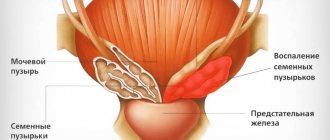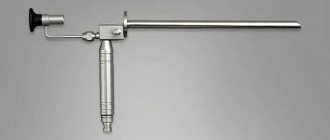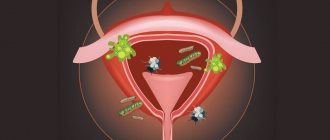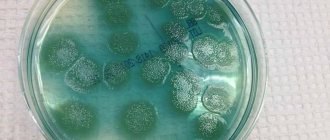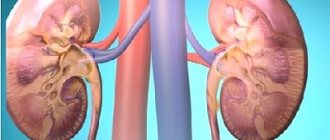Urethritis is an inflammatory disease of the urinary canal - the urethra. The disease is more often diagnosed in men than in women, since the stronger sex has a long and narrow urethra. If the disease is not treated, it becomes chronic. In this case, the symptoms of the disease will arise spontaneously, disturbing the patient for a long time.
Appointment with a urologist, gynecologist - 1000 rubles. Comprehensive pelvic ultrasound - 1000 rubles. Appointment based on ultrasound or test results - 500 rubles (optional)
CLICK TO MAKE AN APPOINTMENT or ultrasound tests
What is urethritis: signs and symptoms
The content of the article
Urethritis is an inflammation of the walls of the urethra. Signs of the disease are discomfort when urinating - pain, stinging, burning, discharge from the urethra.
Under unfavorable conditions, non-infectious urethritis may be accompanied by an infection. In this case, the symptoms of the disease will be mixed, but the characteristic signs will still remain. The main signs of the disease:
- burning and nagging pain when urinating;
- discharge from the urethra;
- discomfort in the perineum.
Mostly, discharge occurs in the morning, during the first urination. They can be purulent or mucopurulent in nature. At the same time, an unpleasant, pungent odor of urine is felt. The discharge can be of different colors, transparent, cloudy, blue or green, depending on the causative agent of the disease.
What does a doctor see when examining a patient?
There are a number of clinical manifestations of urethritis:
- The external opening of the urethra turns red.
- The woman's labia majora, labia minora and vulva turn red.
- The man's glans and foreskin turn red.
- Feeling the penis causes pain to a man.
- Detection by a doctor of discharge from the urethra, a crust that formed after the discharge dried.
- If you feel the external opening of the urethra, the patient feels pain.
A urologist, andrologist, or gynecologist can examine a patient with urethritis. In some cases, this is done by a dermatovenerologist. Women are examined on a gynecological chair. This is necessary in order to identify inflammatory changes in the external genitalia.
Causes of the disease - urethritis
There are two types of urethritis: infectious and non-infectious. More often, urologists diagnose infectious urethritis; the causes of its occurrence may be as follows:
- STIs (STDs) - gonorrhea, chlamydia, trichomonas, mycoplasma and ureaplasma;
- viral infection;
- trauma to the urethra when using a catheter, administering drugs into the urethra, etc.;
- narrowing of the urethra;
- use of toxic substances;
- irradiation;
- allergic reaction.
Consequences of urethritis
If the disease is not treated, it leads to damage to neighboring pelvic organs - the bladder, prostate, and scrotal organs.
Complications in men:
- Prostatitis is inflammation of the prostate gland.
- Orchitis is inflammation of the testicle, inflammation of the epididymis.
- Colliculitis is an inflammation of the seminal tubercle, leading to hemospermia (blood in semen), ejaculation disorders.
- Infertility.
The main and main complication of urethritis is male infertility; it develops against the background of a long-term inflammatory disease. At the same time, the quality of sperm, the size of the ejaculate changes and erectile function is impaired. Complications in women:
In women, urethritis most often turns into cystitis - inflammation of the bladder, frequent and painful urge to urinate, and an increase in body temperature.
In both women and men, urethritis ends with a narrowing (stricture) of the urethra. In advanced cases, a complete adhesion occurs, then urine does not exit through the urethra.
What diseases can it be associated with?
In women, the concentration of infection in the urethra creates favorable conditions for the development of an infectious process in the vagina, and in men it can lead to inflammation of the prostate gland, bladder, and scrotal organs:
- colpitis (vaginitis) is an inflammatory process that develops in the vaginal mucosa, the causative agent of which is usually chlamydia, trichomonas, mycoplasma, streptococcus, staphylococcus and similar microorganisms or their association;
- prostatitis is an inflammatory process localized in the prostate gland, one of the causes of which may be infection;
- epididymitis is an inflammatory process affecting the epididymis and manifested by hyperemia, swelling and swelling of the scrotal area;
- orchitis is an inflammation of the male testicle, usually developing as a complication of gonorrhea, mumps, and influenza.
Male diseases in their spread can also cause infertility.
Cystitis (inflammation of the mucous membrane of the bladder) and a violation of the vaginal microflora (bacterial vaginosis) are the most associated diseases among women with urethritis.
Compression of the urethra, and therefore the development of urethritis, can be facilitated by the presence of tumor formations in the area of the urethra or urolithiasis and narrowing of the urethra due to the passage of stones through it.
Secondary urethritis becomes a consequence of the spread of infection throughout the body from inflammation of the pelvic organs, as well as pneumonia, sore throat, and influenza, which is rare, but does occur.
Diagnosis of urethritis
If you notice the first symptoms of the disease, you should consult a urologist. He will prescribe a number of diagnostic procedures without which it is impossible to establish the true cause of the disease.
Patients undergo:
- diagnostics by PCR method;
- women - a smear on the flora;
- men - urethral smear:
- urine test for bacterial culture.
Treatment will directly depend on the test results. The urologist must identify the cause of urethritis and prescribe complex therapy to quickly eliminate the unpleasant symptoms of inflammation. A urine test for bacterial culture takes about 14 days to prepare, so the doctor can prescribe treatment for the patient immediately, and after receiving the test results, adjust drug therapy by prescribing additional medications.
Types of urethritis
There are two types of urethritis: infectious and non-infectious. More often, urologists diagnose infectious urethritis. Based on the test results, if the disease is associated with an infection, the following diagnosis can be made:
- Bacterial urethritis;
- Viral urethritis;
- Gonorrheal urethritis;
- Chlamydial urethritis;
- Trichomonas urethritis;
- Candidiasis urethritis.
Depending on the cause of occurrence, infectious urethritis is:
- Specific, caused by STD pathogens.
- Nonspecific - a consequence of the activity of opportunistic flora, which is always present in the human body, but becomes dangerous only when the immune system is weakened. These include staphylococcus, streptococcal infection, candida fungi (thrush), Proteus and E. coli.
The diagnosis also clarifies whether the urethritis is primary or secondary.
Primary inflammation of the urethra begins immediately in the urethra. Secondary - a consequence of infection from other organs, for example, infection can spread from the bladder or prostate gland. Direct infection occurs through sexual contact or poor hygiene.
Causes of urethritis
Urethritis is an inflammatory process that develops in the urethra due to factors of infectious or non-infectious origin.
It develops in representatives of both sexes, but in mature men it is diagnosed more often, because due to anatomical features it is felt more acutely, which forces them to seek medical help. In women, the manifestations of urethritis are less pronounced; in certain cases, the disease is not treated with due attention. The causes of urethritis include infection with pathogenic microorganisms (in the majority of cases) or the development of inflammation in the urethra due to allergies or injury. In the latter case, there is non-infectious urethritis, which can become the basis for the development of an infectious lesion. The group of infectious urethritis includes specific urethritis (such as gonorrheal, trichomonas) and nonspecific (such as chlamydial, mycoplasma).
Specific infectious urethritis are those in the development of which sexually transmitted microorganisms are involved - these are usually gonococcus and Trichomonas. A wide variety of microorganisms are related to the development of nonspecific urethritis - staphylococci, enterococci, pneumococci, streptococci, Proteus, E. coli, mycoplasmas, chlamydia, yeast fungi, viruses and various combinations of them at the same time.
It is important in the etiology of the disease to determine the factors that determine the routes of infection into the body and shape its level of susceptibility:
- violation of hygiene standards;
- promiscuous sexual intercourse;
- prolonged and overly active sexual intercourse;
- sexual intercourse during menstruation;
- sexual intercourse while heavily intoxicated;
- decreased immunity and protective properties of the body;
- hypovitaminosis;
- hypothermia;
- narrowing of the urethra (for example, due to tumors of the urethra or urolithiasis);
- development of local allergic reactions;
- irritation of the urethra with chemicals (for example, spermicides);
- trauma to the urethra (eg, foreign bodies, urinary catheter).
In medical practice, primary and secondary urethritis are distinguished:
- primary begins exclusively with inflammation in the urethra;
- The secondary one basically contains a focus of inflammation somewhat distant from the urethra - be it bacterial diseases of the pelvic organs (prostatitis, vaginitis) or pneumonia or sore throat with such a distant spread of infection.
Primary urethritis is considered more common.
There are also anterior and posterior urethritis:
- anterior - inflammation affects the anterior urethra to the external sphincter;
- posterior - inflammation develops in the posterior part of the urethra.
The symptoms of urethritis are varied and depend on the nature of the occurrence and nature of the inflammatory reaction. It is noteworthy that, depending on the origin, urethritis can manifest itself either a few hours or several weeks after infection:
- the incubation period of allergic urethritis is the shortest - a few hours;
- nonspecific bacterial urethritis appears after 3-6 days, under certain circumstances and after 6-10 weeks;
- gonorrheal urethritis makes itself known 4-7 days after infection, sometimes the incubation period can be 4-6 weeks;
- Trichomonas urethritis appears after 10 days;
- viral, mycoplasma and chlamydial urethritis appear as the first symptoms after several months.
The clinical picture of urethritis is determined by the form of its course - acute or chronic. Traditionally, chronic urethritis is a complicated form of acute urethritis, the development of which is more typical for trichomonas, chlamydial, and mycoplasma infections. Chronic urethritis reminds itself of:
- mild itching;
- slight burning sensation along the urethra;
- slight discharge from the urethra - mucopurulent, in the amount of a few drops;
- clumping of the urethral sponges.
Acute anterior urethritis is accompanied by the following symptoms:
- itching and burning along the hanging part of the urethra;
- gluing of the external opening of the urethra in the morning;
- urethral sponges are swollen;
- pain when urinating;
- abundant mucopurulent or purulent discharge from the external opening of the urethra (may vary depending on the type of pathogen);
- discharge may form yellowish crusts on the glans penis;
- general condition is often satisfactory.
In acute posterior urethritis, along with local symptoms, a noticeable worsening of general symptoms comes to the fore:
- weakness;
- brokenness;
- increased body temperature;
- painful and frequent, with scanty urination;
- sometimes at the end of urination, blood is released from the external opening of the urethra;
- Painful erections are sometimes observed.
Bacterial urethritis
The cause of nonspecific urethritis is an opportunistic flora that is activated during injuries associated with medical procedures. The infection is acquired through bladder catheterization, endoscopic procedures, and sexual contact with a partner infected with an STI. The incubation period lasts from several hours to several days.
Primary bacterial urethritis occurs:
- Acute - manifested by vivid symptoms: pain, itching, burning during urination, discharge, slight swelling and redness of the mucous membrane of the urethra and the opening of the urethra.
- Chronic - symptoms subside, the disease manifests itself as exacerbations, for example, with hypothermia, ingestion of spicy food, antibiotics. The peculiarity of chronic bacterial urethritis is resistance to many drugs; it is already difficult to cure the disease.
Since the signs of bacterial and gonorrheal urethritis are similar, the diagnosis is made if gonococci are absent in the tests.
Secondary bacterial urethritis is a complication of infectious inflammation in various organs - the bladder, prostate gland, seminal vesicles, throat (with tonsillitis), pneumonia. The disease proceeds hidden. Symptoms may include mild pain when urinating, mucous discharge from the urethra. The first two- to three-glass urine sample contains many leukocytes, so it is cloudy. With each new portion, the number of leukocytes decreases.
To confirm the diagnosis, a smear analysis is performed to identify the pathogen. Then you need an antibacterial sensitivity test, which establishes the effectiveness of the drugs against the detected pathogen. Self-medication without these tests will not yield anything, since the bacteria that cause urethritis quickly adapt to the drugs.
How bacterial urethritis will be treated is determined by a urologist or gynecologist (in women). The doctor is guided by a whole group of data: the type of pathogen, the degree of the process, the severity of symptoms, the presence of complications and allergies to medications. In any case, treatment should be comprehensive:
- taking antibacterial drugs that destroy pathogens:
- instillation (washing) of the urethra with antibacterial solutions;
- restoration and strengthening of immunity;
- restoration of the microflora of the stomach and intestines, disturbed by the use of antibiotics.
The prognosis for cure will be good only if the source of infection is completely eliminated.
Drug treatment
For uncomplicated forms of the disease, outpatient treatment is practiced - when the patient receives detailed recommendations from the doctor and takes medications at home, at home.
Treatment of nonspecific urethritis in women
Urethritis caused by one of the opportunistic pathogens is called nonspecific.
In women, 80% of cases are caused by E. coli or other microorganisms, and the disease is called nonspecific urethritis.
Unfortunately, children are not immune from this problem.
In them, the process is provoked by violation of hygiene rules and hypothermia of the pelvic organs.
They can also become infected through household means.
Treatment of urethritis in children is carried out according to the same principles as in adults, but taking into account the age-related characteristics of the genital organs.
Naturally, the doses of medications must be selected appropriately.
Gonorrheal urethritis
Gonococci enter the urethra through sexual contact, less often due to violation of hygiene rules when using common things and the toilet. The first symptoms of gonorrheal urethritis are noticeable 3-4 days after infection. With strong immunity, the disease can remain dormant for up to 3 weeks.
Gonorrheal urethritis can be:
- Acute (fresh) when infected for up to 2 months. Signs: purulent yellowish discharge, pain, burning, pain when urinating. appear suddenly. With deep penetration of the infection, the temperature rises to 38-39 ° C.
- Chronic - if the disease has been delayed for more than 2 months. The reasons are improper treatment, extensive spread of the process affecting the prostate gland. The symptoms of chronic gonorrheal urethritis are vague. Patients experience mild itching, mild burning and tingling pain in the urethra when urinating. In the morning you may notice some discharge.
Over time, the paraurethral glands are also affected. Due to outflow disturbances, an abscess (purulent inflammation) and encysted cavities develop. Because of this, the condition worsens and surgery may be required.
The symptoms of gonorrheal urethritis are similar to other types of bacterial infection, so the diagnosis is made based on the results of smears from the urethra, which reveal gonococci (Neisseria gonorrhoeae).
Treatment of gonorrheal urethritis
How treatment will be carried out is decided by the urologist, and in women - by the gynecologist. The doctor selects effective antibiotics and prescribes a special diet that excludes foods that irritate the mucous membranes.
Chronic gonorrheal urethritis takes longer and is more difficult to treat. In addition to antibiotics, you will have to endure unpleasant procedures - instillation of rinsing solutions into the urethra. When scar-sclerotic processes begin, bougienage (dilation) of the urethra is performed.
A week after treatment, an additional study is carried out to confirm that the disease is completely eradicated. Patients undergo smears for gonococci and undergo provocation - exposure to various methods that contribute to exacerbation. If the infection remains, then, for example, after drinking alcohol or spicy food, gonococci are again present in the discharge.
The studies are repeated twice with a period of 1 month. In men, the secretions of the prostate gland are checked several times, and smears are taken from the urethra. It is important to understand that the disease does not create immunity, i.e. You can become infected with gonorrheal urethritis several times.
The prognosis for curing fresh urethritis is favorable, but chronic infection can last for years. At the same time, the patient remains infectious, so he is forced to use barrier methods of contraception constantly.
The disease causes severe complications - vesiculitis, chronic prostatitis, impotence, infertility.
How to treat urethritis?
Treatment of urethritis is determined to a greater extent by its causative agent, as well as the presence of concomitant diseases, which no less require attention.
Treatment of gonorrheal urethritis requires the use of cephalosporins, preferably second and third generation, fluoroquinolones, and macrolides. Modern medical developments show that gonococci are often resistant to penicillin, and therefore its use is minimized. Local treatment is carried out by instillation of medicinal solutions into the urethra, and the predominance of scar-sclerotic processes and solid infiltrate determines the need for dilation of the urethra and inductotherapy. Internal optical urethrotomy is used for the formation of urethral strictures, which usually have a distinct shape and are located at the pendulous part of the urethra.
Treatment of chlamydial and mycoplasma urethritis can occur through the use of etiotropic, pathogenetic and symptomatic therapy. It is advisable to prescribe antibiotics - azithromycins, josamycins, tetracyclines. Urologists note a noticeable and immediate therapeutic effect from the use of fluoroquinolones - ofloxacin or pefloxacin.
Treatment of trichomonas urethritis necessitates the use of metronidazole in accordance with the regimen determined by the doctor; in some cases, a repeated course of the drug is appropriate. If urethritis becomes chronic, it is advisable to increase single doses of metronidazole and the frequency of its administration. In addition, it would be appropriate to instill medicinal solutions into the urethra.
Treatment of bacterial urethritis is impossible without the use of broad-spectrum antibiotics in combination with immunostimulating therapy.
Treatment of candidomycotic urethritis requires the use of broad-spectrum antifungal drugs (nystatin or levorin); it is important to ensure a prolonged effect. It is advisable to supplement the effect of medications with the action of vitamin therapy and immunomodulators.
Immunostimulating therapy is strictly recommended as part of the treatment of urethritis, regardless of the type of pathogen. The specific drug and its dosage are determined by the attending physician in each individual case, and today Viferon, Lykopid, Timalin, Timogen, Immunal are popular.
Trichomonas urethritis
The disease is most often acquired through sexual contact. Symptoms do not appear immediately: with weak immunity, the first signs are felt 5 days after infection, with strong immunity - after 2 weeks. Patients are concerned about mild itching, foamy discharge with a white tint.
The diagnosis is made based on test results in the presence of trichomonas (Trichomonas vaginalis) in smears and scrapings. It happens that trichomonas are not detected immediately, so if trichomonas urethritis is suspected, several different tests are prescribed - smears and cultures.
Treatment is carried out with anti-trichomonas drugs and diet. Often there is more than one infection, so the doctor selects complex medications. Treatment of chronic Trichomonas urethritis is supplemented by instillations of a 1% solution of Trichomonacid. A minimum of 6 procedures of 10-15 minutes each is required.
Since the infection is an STI, both partners must be treated at the same time. You cannot self-medicate, since prostatitis will be a complication of this type of urethritis in men.
Chlamydial urethritis
The disease is caused by chlamydia Chlamydia trachomatis - microorganisms that occupy an intermediate position between viruses and bacteria. Chlamydia, entering the body sexually, affects the integumentary cells of the urethra, vagina and cervix. The infection may spread to the conjunctiva of the eyes.
Chlamydial urethritis can occur latently or with mild symptoms, which complicates its diagnosis. Inflammation in the urethra can be complemented by inflammation of the joints. Chlamydia can be detected by testing for infections.
Treatment of chlamydial urethritis is long and complex due to the resistance of chlamydia to most drugs. In addition to antibiotics, concomitant treatment of organs affected by the infection is prescribed, for example, corticosteroid (hormonal) drugs are used - dexamethasone or prednisolone.
Candidiasis urethritis
This type of urethritis is less common and is caused by candida fungi, which belong to the opportunistic flora. Candidiasis urethritis is not considered an independent disease, but a complication against the background of decreased immunity due to chronic diseases, injuries, taking antibiotics, etc.
The disease is practically asymptomatic. The patient may notice a slight burning sensation and a faint cheesy discharge. Candida urethritis is treated with antifungal drugs, eliminating antibiotics that kill lactobacilli, providing local immunity.
Drug therapy
The basis of drug treatment, first of all, is the regular use of strong antibacterial drugs (macrolides, penicillins, cephalosporins, etc.). The course of antibacterial therapy is carried out for quite a long time. In addition, in some cases, the use of products from the nitrofuran group is recommended. The selection of drugs is carried out individually for each patient, based on the nature and severity of his disease, as well as age and concomitant pathology.
Also, for the treatment of urethritis, local therapy is recommended - injection of antiseptic solutions (furatsilin or miramistin) directly into the urethra.
Where to cure urethritis in St. Petersburg
You should not try to get rid of the symptoms of urethritis using folk remedies or try to cure the disease yourself - this will lead to serious complications. If you notice symptoms of urethritis, contact the specialized urologist-gynecological clinic Diana in St. Petersburg.
Often the disease occurs in a latent form. It is difficult to diagnose because a person has no symptoms of urethritis. In this case, the disease can only be detected through laboratory tests; as a preventive measure, it is recommended to visit a doctor once every six months.
If you find an error, please select a piece of text and press Ctrl+Enter
